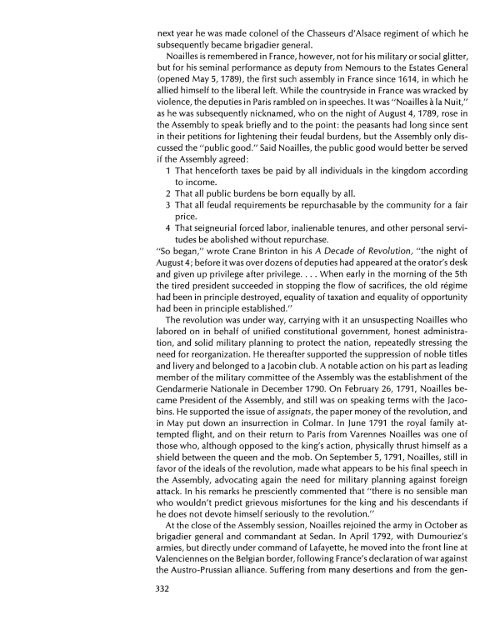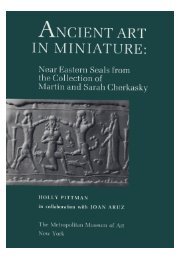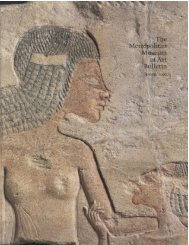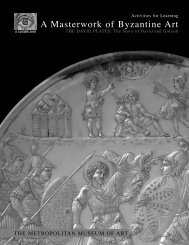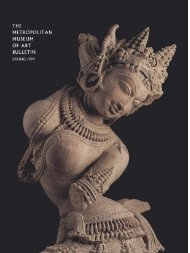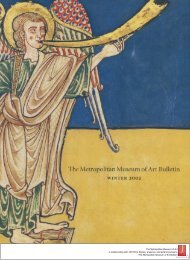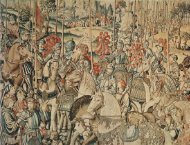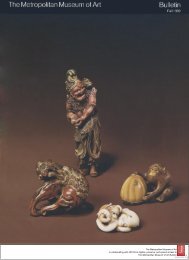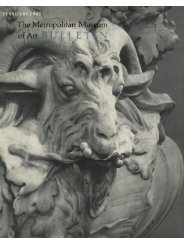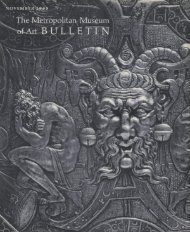The Metropolitan Museum of Art Bulletin, v. 29, no. 7 (March, 1971)
The Metropolitan Museum of Art Bulletin, v. 29, no. 7 (March, 1971)
The Metropolitan Museum of Art Bulletin, v. 29, no. 7 (March, 1971)
Create successful ePaper yourself
Turn your PDF publications into a flip-book with our unique Google optimized e-Paper software.
next year he was made colonel <strong>of</strong> the Chasseurs d'Alsace regiment <strong>of</strong> which he<br />
subsequently became brigadier general.<br />
Noailles is remembered in France, however, <strong>no</strong>t for his military or social glitter,<br />
but for his seminal performance as deputy from Nemours to the Estates General<br />
(opened May 5,1789), the first such assembly in France since 1614, in which he<br />
allied himself to the liberal left. While the countryside in France was wracked by<br />
violence, the deputies in Paris rambled on in speeches. It was "Noailles a la Nuit,"<br />
as he was subsequently nicknamed, who on the night <strong>of</strong> August 4, 1789, rose in<br />
the Assembly to speak briefly and to the point: the peasants had long since sent<br />
in their petitions for lightening their feudal burdens, but the Assembly only discussed<br />
the "public good." Said Noailles, the public good would better be served<br />
if the Assembly agreed:<br />
1 That henceforth taxes be paid by all individuals in the kingdom according<br />
to income.<br />
2 That all public burdens be born equally by all.<br />
3 That all feudal requirements be repurchasable by the community for a fair<br />
price.<br />
4 That seigneurial forced labor, inalienable tenures, and other personal servitudes<br />
be abolished without repurchase.<br />
"So began," wrote Crane Brinton in his A Decade <strong>of</strong> Revolution, "the night <strong>of</strong><br />
August 4; before it was over dozens <strong>of</strong> deputies had appeared at the orator's desk<br />
and given up privilege after privilege .... When early in the morning <strong>of</strong> the 5th<br />
the tired president succeeded in stopping the flow <strong>of</strong> sacrifices, the old regime<br />
had been in principle destroyed, equality <strong>of</strong> taxation and equality <strong>of</strong> opportunity<br />
had been in principle established."<br />
<strong>The</strong> revolution was under way, carrying with it an unsuspecting Noailles who<br />
labored on in behalf <strong>of</strong> unified constitutional government, honest administration,<br />
and solid military planning to protect the nation, repeatedly stressing the<br />
need for reorganization. He thereafter supported the suppression <strong>of</strong> <strong>no</strong>ble titles<br />
and livery and belonged to a Jacobin club. A <strong>no</strong>table action on his part as leading<br />
member <strong>of</strong> the military committee <strong>of</strong> the Assembly was the establishment <strong>of</strong> the<br />
Gendarmerie Nationale in December 1790. On February 26, 1791, Noailles became<br />
President <strong>of</strong> the Assembly, and still was on speaking terms with the Jacobins.<br />
He supported the issue <strong>of</strong> assignats, the paper money <strong>of</strong> the revolution, and<br />
in May put down an insurrection in Colmar. In June 1791 the royal family attempted<br />
flight, and on their return to Paris from Varennes Noailles was one <strong>of</strong><br />
those who, although opposed to the king's action, physically thrust himself as a<br />
shield between the queen and the mob. On September 5,1791, Noailles, still in<br />
favor <strong>of</strong> the ideals <strong>of</strong> the revolution, made what appears to be his final speech in<br />
the Assembly, advocating again the need for military planning against foreign<br />
attack. In his remarks he presciently commented that "there is <strong>no</strong> sensible man<br />
who wouldn't predict grievous misfortunes for the king and his descendants if<br />
he does <strong>no</strong>t devote himself seriously to the revolution."<br />
At the close <strong>of</strong> the Assembly session, Noailles rejoined the army in October as<br />
brigadier general and commandant at Sedan. In April 1792, with Dumouriez's<br />
armies, but directly under command <strong>of</strong> Lafayette, he moved into the front line at<br />
Valenciennes on the Belgian border, following France's declaration <strong>of</strong> war against<br />
the Austro-Prussian alliance. Suffering from many desertions and from the gen-<br />
332


